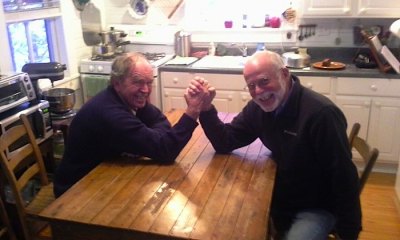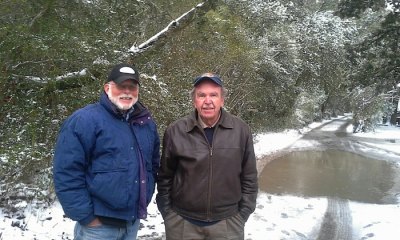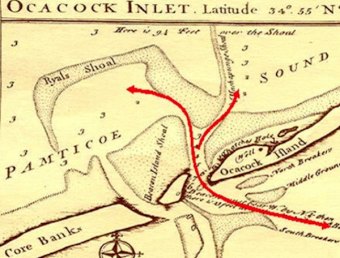Ocracoke Land Dispute Rages on After 256 Years
First came the Native Americans. They enjoyed undisputed use (at least seasonally) of Ocracoke (along with, less importantly, the rest of North and South America) for about ten thousand years. Then in 1663, King Charles II of England, noting that the Indians did not hold any legal titles or deeds, generously awarded ownership of the Carolinas to a group of his buddies who came to be known as the Eight Lords Proprietors. Of course none of these gents ever set foot on this side of the pond – heavens no! – they were too busy sipping claret, hunting foxes and attending royal balls.
In 1719, for reasons unknown, the Lords Proprietors granted Ocracoke to a Quaker by the name of John Lovick who, like the L.P.s themselves, preferred to view the island purely as an investment and continue to reside in England. With cold beer, bug repellent and ferry access still centuries away, who could blame him?
Lovick finally found a buyer for the island a few years later, an English-born sea captain named Richard Sanderson who, when not at sea, resided in Currituck, N.C. Sanderson had an ocean-going ship with which he imported cargoes (possibly slaves) through Ocracoke Inlet. He kept two lighter vessels here at Ocracoke for distributing his cargoes across the sounds. Eventually, Sanderson passed ownership of the island to his son, Richard Junior. Not being a seafarer himself, Junior had no use for Ocracoke so, at the age of 29, he happily sold the island in 1759 to William Howard for the tidy sum of 105 British pounds (about $87,000 in today’s money). Having long since retired from piracy (he’d been Blackbeard’s quartermaster in his early days), Howard was looking for just such a place to settle with his family. He built a house on what is known as Springer’s Point and became the first of the island’s Caucasian owners to live here.
Four years ago, a descendent of Captain Sanderson made his first ever trip to Ocracoke on a quest for some family history. As luck would have it, he happened on a visit to the O.P.S. museum to run into Philip Howard, a local history buff who traces his lineage back eight generations to William Howard. Their conversation was mutually rewarding to the extent that it was no surprise to Philip when he recently heard from Sanderson’s brother, Dale “Sandy” Sanderson who wanted to visit Ocracoke to learn about his family’s past.

Philip thoughtfully contacted Sundae Horn and invited her to sit in on the interview and write it up for the Current. Being overwhelmed by a busy schedule, she quickly delegated the task to her grossly underemployed spouse with inducements she has no intention of honoring.
And so it was that yours truly went slogging out through the falling snow in pursuit of a story. The two guys appeared a bit disappointed at Sundae’s “bait-and-switch” but kindly welcomed me into Philip’s kitchen anyway. When I arrived, they were discussing the price Philip’s ancestor had paid to Sandy’s ancestor.
“I offered to buy the island back for twice the amount,” Sandy told me, “but Philip won’t sell!” They were settling the matter by arm-wrestling. That’s apparently how they do things out west.
The Sandersons have gradually spread westward from these shores, settling in Tennessee, Alabama, Mississippi, Arkansas and Texas. Sandy now hails from Loveland, Colorado.
At Philip’s suggestion we wandered across Howard Street to pay a visit to his 95-year-old cousin Blanche Howard Jolliff. A family historian herself, Blanche was obviously excited to be face to face with a direct descendent of her ancestor’s business associate.

I asked Sandy if he planned to write a book. Turns out he does but not about the Sandersons. He’s been doing even more extensive research on Lewis and Clark.
“The Sanderson history,” he explained, “is really just for my grandchildren.”
Every family should have a genealogy enthusiast to keep the legacy alive.




